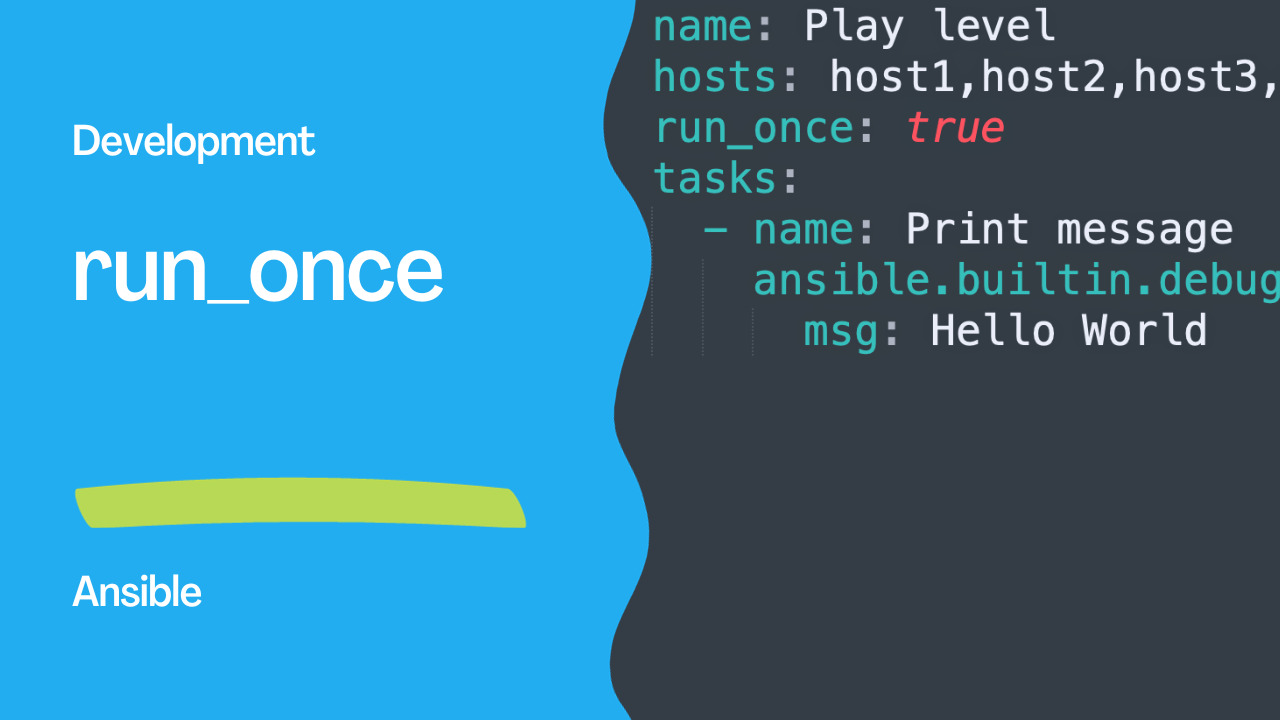Introduction
Ansible is a powerful automation tool that makes managing IT infrastructure easier. One of its lesser-known but highly useful directives is “run_once.” While using it at the play level might seem unremarkable, its true potentials reveals itself when employed within a task. Let’s explore the wonders of run_once and how it can simplify complex automation scenarios.
Play Level
At the play level, using run_once is equivalent to changing the host selection. Instead of specifying hosts as “foo” you’d use “foo[0]”. This makes it convenient for directing tasks to a specific host but doesn’t necessarily elicit much excitement.
- name: Play level
hosts: host1,host2,host3,host4,host5,host6,host7
run_once: true
tasks:
- name: Print message
ansible.builtin.debug:
msg: Hello World
However, the real enchantment occurs when you use run_once within a task. When you do this, tasks with run_once are executed on a single host, typically the first host in the runlist. This simple feature allows for intricate choreography. For instance, you can send a command to a cluster only once, even if there are multiple equally available hosts in the cluster group. Furthermore, with the ability to continue executing playbooks even when some hosts are unavailable, you can ensure your command reaches the first available node in the cluster. It’s very useful in its utility.
Task Level
What happens when you combine run_once with the “register” directive? You might wonder if the variable for hosts where the command wasn’t run remains undefined or contains some “skipped” message, as can occur with other combinations of directives like “when” and “register`.”
In this case, Ansible behaves in the best way imaginable. The registered variable is created for all hosts in the runlist, even if the task was executed on a single host. When you combine it with delegation, it becomes even more elegant.
One of the best applications of this feature is in gathering “pseudo-facts.” For example:
- name: Get data
ansible.builtin.command: data get
run_once: true
register: data
Previously, you might have added this to the play without concerns. While it’s slightly inefficient, it’s concise and straightforward. Now, it becomes a real trick that dramatically reduces the number of calls to the delegated host.

Pseudo-facts
Imagine a playbook with multiple hosts, and you want to set a fact using run_once:
- name: Pseudo-facts playbook
hosts: host1,host2,host3,host4,host5,host6,host7
tasks:
- name: Set fact
run_once: true
ansible.builtin.set_fact:
foo: 42
- name: Print the fast
ansible.builtin.debug:
var: foo
What do you think will happen to “foo” for all hosts in the play? It’s not just magic; it’s sheer brilliance. All hosts will have “foo: 42”. The primary difference from a version lacking run_once is the reduction in output. This feature is especially valuable when working with loops and other complex automation constructs, making it a fantastic way to streamline your Ansible playbooks.
Conclusion
In conclusion, the “run_once” directive in Ansible might seem simple at first, but it holds incredible power. Whether you want to send a command to a single host in a group, efficiently gather “pseudo-facts,” or streamline your playbook output, run_once is a wonderful tool that every Ansible user should be aware of. It Playbooknstrates how the simplest features can bring about the most powerful automation results.
Academy
Learn the Ansible automation technology with some real-life examples in my
Udemy 300+ Lessons Video Course.

My book Ansible By Examples: 200+ Automation Examples For Linux and Windows System Administrator and DevOps

Donate
Want to keep this project going? Please donate
